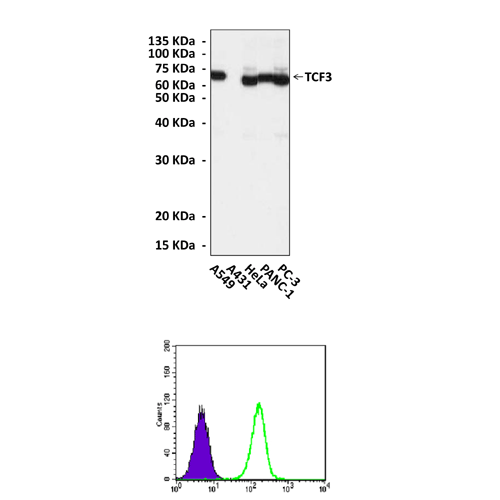Anti-Tcf3: MouseTcf3 Antibody
Mouse Tcf3 Antibody: Mouse Tcf3 Antibody
Size: 100 ul
Price: $413.00
Description
Direct relationships between the biochemical properties of Tcf proteins and their physiological effects have been demonstrated by several studies expressing mutated forms of the proteins in model organisms. Three transcription factors, Nanog, Oct4, and Sox2, have been reported to form a feedforward circuit promoting pluripotent cell self-renewal in embryonic stem cells (ESC). It was shown that Tcf3 acts broadly on a genome-wide scale to reduce the levels of several promoters of self-renewal (Nanog, Tcl1, Tbx3, Esrrb) while not affecting other ESC genes (Oct4, Sox2, Fgf4) and Tcf3 counteracted effects of both Nanog and Oct4. Thus, Tcf3 is a cell-intrinsic inhibitor of pluripotent cell self-renewal that functions by limiting steady-state levels of self-renewal factors.2 In addition, Tcf3 plays important role in regulation of skin stem cells. In the absence of Wnt signals, Tcf3 may function in skin stem cells to maintain an undifferentiated state and, through Wnt signaling, directs these cells along the hair lineage.3 Moreover, studies reveal an essential and unique role for mouse Tcf3 in early development. It was demonstrated that Tcf3 is involved directly in restricting anteroposterior (AP) axis induction during the onset of gastrulation. Similar to its Xenopus and zebrafish homologs, mouse Tcf3 appears to function by repressing target genes in the early embryo.4 Finally, the t(1;19)(q23;p13.3) is one of the most common chromosomal abnormalities in B-cell precursor acute lymphoblastic leukemia (BCP-ALL) and usually gives rise to the Tcf3-PBX1 fusion gene. In addition to its role as a fusion partner gene, it was found that Tcf3 can also act as a tumor suppressor gene in BCP-ALL.5
2. Yi, F. et al: Stem Cells 26:1951-60, 2008
3. Nguyen, H. et al: Cell 127:171-83, 2006
4. Merill, B.J. et al: Development 131:263-74, 2004
5. Barber, K.E. et al: Gene Chromosome Cancer 46:478-86, 2007
Details
| Cat.No.: | CP10234 |
| Antigen: | Short peptide from purified recombinant human TCF3 fragments expressed in E. coli. |
| Isotype: | Mouse IgG1 |
| Species & predicted species cross- reactivity ( ): | Human |
| Applications & Suggested starting dilutions:* | WB 1:500 – 1:2000 IP n/d IHC n/d ICC n/d FACS 1:200 – 1:400 |
| Predicted Molecular Weight of protein: | 68 kDa |
| Specificity/Sensitivity: | Detects endogenous TCF3 proteins without cross-reactivity with other family members. |
| Storage: | Store at -20°C, 4°C for frequent use. Avoid repeated freeze-thaw cycles. |
*Optimal working dilutions must be determined by end user.
